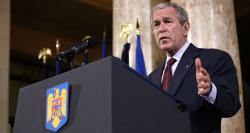
Praising President George W. Bush’s foreign policy skill is a sure way to lose dinner invitations in Washington. So hold the dessert: Bush and his team deserve credit for playing the bad hand of his waning presidency skillfully and tenaciously at this month’s NATO summit in Bucharest.
For the record book: He gained allied approval for his contested missile-defense system with Poland and the Czech Republic, and he won longer-term North Atlantic Treaty Organization commitment to stabilizing Afghanistan, including a pledge from France to send 700 troops. He got Vladimir Putin’s green light to use Russia as an Afghan supply corridor and ease his opposition to the missile-defense system.
The president also won NATO’s first significant enlargement, building on his father’s notion of “A Europe Whole and Free,” by bringing in Croatia and Albania. Greece blocked Macedonia’s entry, but it will enter the moment the two countries can settle their nasty dispute over the country’s name, which Greece considers its property.
Perhaps most importantly, Team U.S.A. headed off what might have been the worst act of appeasement in the alliance’s 59-year- old history. German Chancellor Angela Merkel in 11th-hour negotiations agreed to resounding, historic language promising Georgia and Ukraine future alliance membership even as Germany continued to block the technical process to get them there, known as a membership action plan, or MAP.
Exceeding Expectations
It would be easy to dismiss all the above as half-empty rather than half-full. Bush failed to get a Georgia and Ukraine MAP even though he placed his personal prestige on the line. Russia still balked at a missile-defense deal. The so-called Afghanistan vision statement was short on vision and even shorter on resources. Bottom line: NATO is in trouble and lacking political will.
But count me with the half-full crowd, considering how badly Bucharest could have gone with Bush’s numbers lower than a baritone’s bottom note. Russia was more constructive than it has been in months. On Afghanistan, United Nations and European Union leaders attended a NATO summit for the first time with non-NATO countries that have troops on the ground, underscoring their common cause.
The perennial French “non” has become a strong maybe; President Nicolas Sarkozy will co-host the 60th Anniversary Summit next year with Germany on its border in Strasbourg, where it may well reintegrate into NATO’s military command.
Most telling was the nature of the negotiations that turned the German cold shoulder for Georgia and Ukraine into an opening for the two countries to integrate into the alliance and the EU. How it happened shows that U.S. leadership still matters when properly applied, and how former Soviet-bloc states like Ukraine and Georgia are exercising their diplomatic influence more effectively.
Clear Language
Merkel also rediscovered a conscience shaped by her personal story as a daughter of the Soviet bloc, born in the former East Germany.
The last-minute language had a clarity unlike the usual gobbledygook of summits: “NATO welcomes Ukraine’s and Georgia’s Euro Atlantic aspirations for membership in NATO. We agreed today that these countries will become members of NATO. Both nations have made valuable contributions to Alliance operations.”
The agreement had three important sources.
First, Bush told his negotiators he would rather have allied disunity than unity around an agreement that in any way demonstrated a Russian veto over the sovereign aspirations of its neighbors.
Breaking Deadlocks
Second, Merkel broke a negotiation deadlock by calling for the issue to be sorted out at the leader level. That essentially sidelined German Foreign Minister Frank-Walter Steinmeier, who was seen by NATO officials as the lead opponent to Georgian and Ukrainian aspirations.
Finally, former Soviet-bloc states that have become members of NATO formed an effective lobby. In the most memorable scene in the decisive hour of the three-day summit, representatives from six NATO members that once wore the Soviet yoke circled Merkel in an irresistible swarm while hammering out final wording.
Georgian President Mikheil Saakashvili, who had been resigned to failure when I saw him just hours before the deal, was buoyant when he reviewed the language. “It’s a geopolitical coup,” he said. “Here we got 100 percent commitment.”
Alliance foreign ministers will meet in the final month of the Bush presidency to revisit Georgian and Ukrainian government requests to start the MAP. But if Georgia’s elections in May are free and fair, ensuring its democracy is on track, and if Ukraine’s government can recharge lagging commitments to military and political change, Bush may yet claim his much-desired legacy of advancing freedom.
The process has been a messy one, and the alliance still is far from settling its problems with Russia. Yet as Winston Churchill said of democracy, NATO is the worst alliance except for all the others that have been tried. Bush deserves credit for avoiding the worst — and providing space for alliance leaders to achieve the best.
Frederick Kempe is president and CEO of the Atlantic Council. Originally published 15 April 2008 by Bloomberg News. Reprinted with permission.
Image: 271.warsawbiopic.jpg
